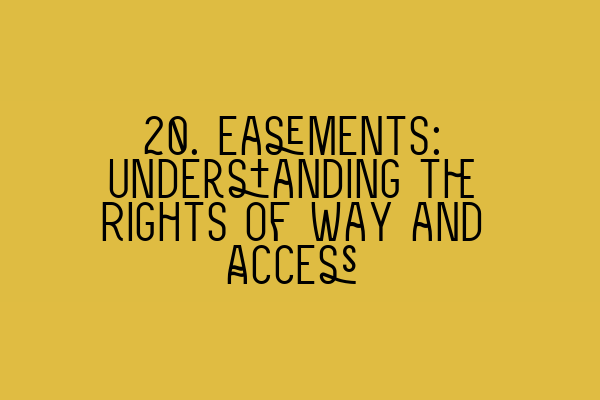Easements: Understanding the Rights of Way and Access
Welcome to the SQE Property Law & Land Law blog! In this article, we will delve into the intricate world of easements, specifically focusing on the rights of way and access. Easements are legal rights that allow individuals to use or access another person’s property for a specific purpose. Understanding easements is crucial for property owners, buyers, and solicitors working in property law. So, let’s dive right in!
What are Easements?
Easements are legal rights that allow someone to use or access another person’s property, either temporarily or permanently, for a specific purpose. These rights can cover a range of activities, such as crossing someone’s land to access a public road, using another’s driveway to access a property, or installing utility lines on someone else’s land. Easements are traditionally classified into three main categories: easements of necessity, easements by prescription, and express easements.
Rights of Way
Rights of way are one of the most common types of easements. They grant individuals the right to pass through or use another person’s property to access a specific destination, such as a road, beach, or park. For example, if a property is landlocked and has no direct access to a public road, the owner may have a right of way over a neighboring property to reach the road.
Rights of way can be created in a few different ways. They may be expressly granted in a legal document, such as a deed or contract, or they can be implied by the circumstances surrounding the use of the property. In some cases, rights of way may also be acquired through long-term use, known as a prescriptive easement.
Access Easements
Access easements, also known as easements of access, are similar to rights of way but are typically more limited in scope. These easements allow individuals to access another person’s property for a specific purpose, such as maintenance or repair work. Access easements are commonly used when a property relies on shared infrastructure, such as a driveway or common hallway, which needs to be accessed by multiple property owners.
Like rights of way, access easements can be created through express grant, implication, or long-term use. They are usually documented in legal agreements or property deeds, outlining the specific terms and conditions of the access.
Importance of Understanding Easements
Having a clear understanding of easements is crucial for property owners, buyers, and legal professionals. When purchasing a property, it is essential to conduct thorough due diligence to identify any existing easements that may affect the property’s use and enjoyment. As a property owner, being aware of any easements on your land, as well as any rights you may hold over another’s land, can prevent legal disputes and ensure peaceful coexistence.
For solicitors practicing property law, understanding easements is essential for providing sound legal advice to clients. Being well-versed in the different types of easements, their creation, and potential disputes helps solicitors navigate complex real estate transactions and avoid potential legal pitfalls.
Conclusion
Easements play a critical role in property law, granting individuals the right to use or access another person’s property. Rights of way and access easements are two common types of easements that facilitate movement and access. Understanding easements is vital for property owners, buyers, and legal professionals to protect their rights and avoid conflicts.
If you’re preparing for the SQE 1 exams, make sure to check out our SQE 1 Practice Exam Questionsand SQE 1 Practice Mocks FLK1 FLK2. For SQE 2 preparation, we offer comprehensive SQE 2 Preparation Courses, and if you need assistance with SQE 1, we have got you covered with our SQE 1 Preparation Courses. Stay updated with the latest SRA SQE Exam Dates by visiting our SRA SQE Exam Dates page.
Thank you for reading this blog post! If you have any questions or need legal assistance with any property law matters, don’t hesitate to get in touch with us at SQE Property Law & Land Law.
